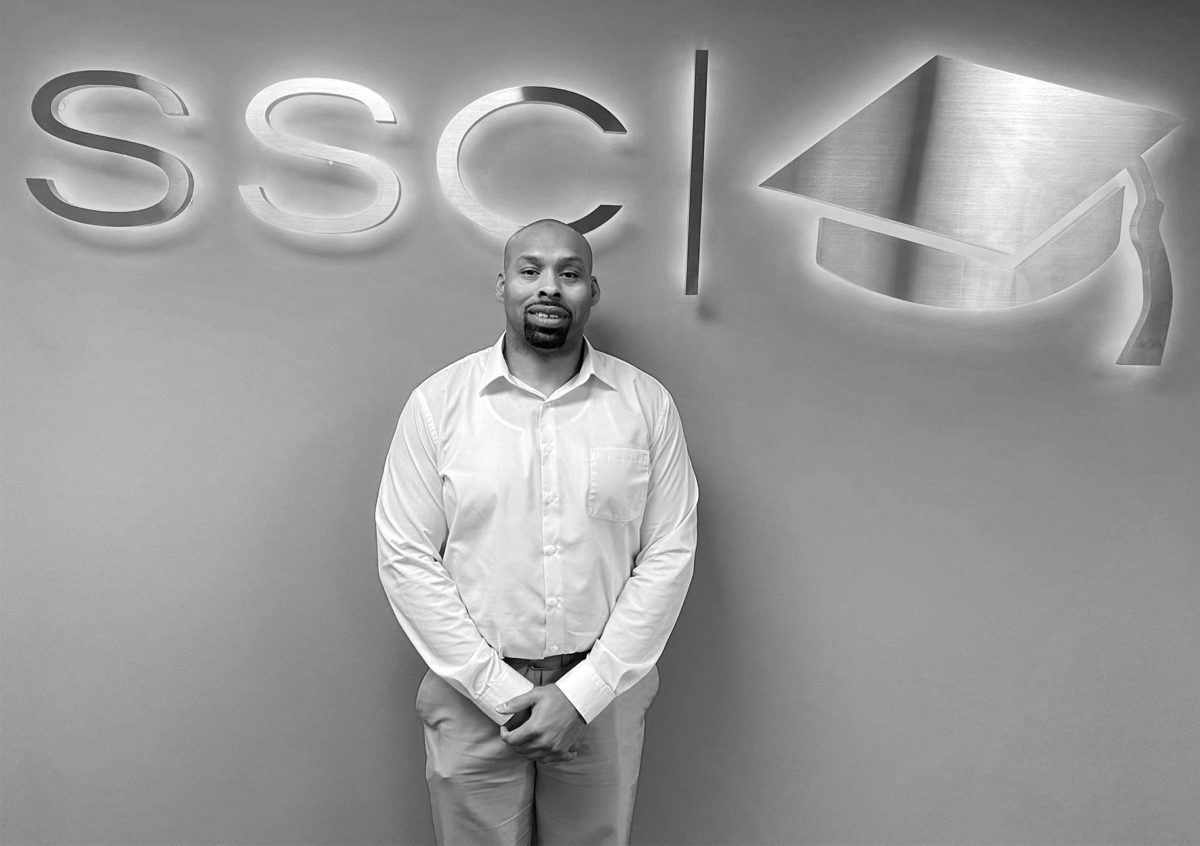
How To Support Veterans in the Workplace: Advice from a Veteran
According to the Society for Human Resource Management’s guidebook for hiring veterans, 55% of veterans report employment as a top transition challenge when returning to civilian life. After years, sometimes even decades, of service to our country, veterans face the challenge of finding a job that matches their career interests and an employer who understands the value of their skills and experiences.
Dr. Timothy Foy, SSC Unit Director, is no stranger to the process. Timothy served in the military reserves for 11 years (2008-2019), and while he has found his home with SSC, he sees many of his fellow veterans struggle to find a place in the civilian workforce.
In recognition of Veteran’s Day, we sat down with Timothy to discuss the unique qualifications that service members and veterans offer employers in the civilian workforce and how employers can focus on recruiting veterans and supporting these individuals.

Meet Timothy Foy
Dr. Timothy Foy was born and raised in section 8 housing in Chicago, IL. As one of six children and a first-generation college student, he prides himself on overcoming the odds and creating a life for himself and his family. He received his bachelor’s in organizational management, a master’s in healthcare administration, a doctorate in organizational management (ABD), and a doctorate in educational leadership. At 13, Timothy began to work with his father, a floor technician at a local car dealership, and learn the art of floor care. At 15, he secured his first job in housekeeping. He continued to work in the field through college, eventually moving up the ranks to become a floor tech, supervisor, manager, Ops Manager, Director, and Regional VP of Operations.
In addition to his career in the civilian world, Timothy served in the military reserves. He entered the reserves as an E4 and left as a captain. During this time, Timothy held various roles as a contract administrator, drill sergeant, healthcare administrator, and training officer. He also became a published author and was also an adjunct college professor for approximately six years.
With an impressive career already under his belt, Timothy joined the SSC team in July 2022 as a Unit Director in Indiana.
Hiring Veterans: Reaching Untapped Potential
Timothy’s experiences in the military and civilian workforce have made one clear: Many employers don’t realize the untapped potential of military veterans. The skills on a veteran’s resume may not be identical to those of someone in the corporate world, but they hold value and can create an immense impact in an organization.
“A lot of people don’t understand what leadership in the military entails. It’s real teamwork: You must know your teammates, your soldiers, inside and out, to the point where on the battlefield or in training, you can walk in a pitch-black area and know a person just by their walk. That is the kind of relationship that military brothers and sisters develop. You know their insides and outsides, weaknesses, and strengths. You let their strengths rub off on you and build their weaknesses into an opportunity. People don’t understand the work ethic a soldier brings to the table.”
Beyond teamwork, veterans have a deep-rooted understanding of diversity:
“Veterans bring hands-on diversity experiences, things you can’t learn in a monthly diversity training. We have witnessed different ways of doing things, different ways of presenting ourselves, and culture shocks. There is no better person to acclimate to a role than a veteran that has traveled the world.”
It is evident that veterans bring unparalleled teamwork and dedication to the table, but how do employers maximize their impact and satisfaction within a job?
Creative Veteran-Friendly Work Environments
According to Timothy, three factors contribute to the success and satisfaction of veterans in the workplace: Structure, opportunity, and respect.
Structure:
Many veterans entering the workforce have never known anything but a structured lifestyle.
“You are born and go to kindergarten, and there is structure. You have structure through the 12th grade. When you graduate and go into the military from that age, you spend 20 years with structure. After, when you go into the workforce, all you know is structure. If you are thrown into a nonstructured environment, you will fail. A lot of times, if veterans are in a place that isn’t structured, they have no sense of direction and are seen as ineffective and inefficient.”
At SSC, our partner schools rely on us to provide consistent cleaning with excellent service. When it comes to supporting veterans in the workplace, they have similar needs: set expectations, structured tasks, and clear understanding of responsibilities. Having these factors in place prior to recruiting veterans provides associates with a sense of purpose and a clear way to contribute effectively.
Opportunity:
The military provides clear paths to leadership. When researching any military branch, you can easily find the progression of ranks and the qualifications to attain the next rank. Military members can see and strive for their future position with a clear path for growth. In the workplace, growth can be a bit more ambiguous. When recruiting veterans, it is essential to provide a clear path for their career progression. As employers, we should be able to communicate what qualifications are necessary to move to a higher-level position and what this timeline looks like.
Respect:
Respect is essential in any workplace. Unfortunately, respect isn’t always instinctual, and many veterans notice that.
“The military is very big on respect. A lot of times, military soldiers, it doesn’t matter their rank in the army, when someone sees them in uniform, they give them respect because they are fighting for our country. Sometimes military members go from getting all that respect for 20 years into a role when they aren’t getting any respect at all.”
Timothy expressed that if a veteran is in a role where they do not feel respected, they will not be satisfied and ultimately will leave the organization. This serves as a great reminder that a great company culture makes all the difference for both veterans and everyday civilians.
SSC would like to send a huge thank you to all who have served or are currently serving our country. We greatly appreciate the sacrifices made by each of you and your families. For more industry stories, check out our news center and follow us on LinkedIn, Facebook, and Instagram.